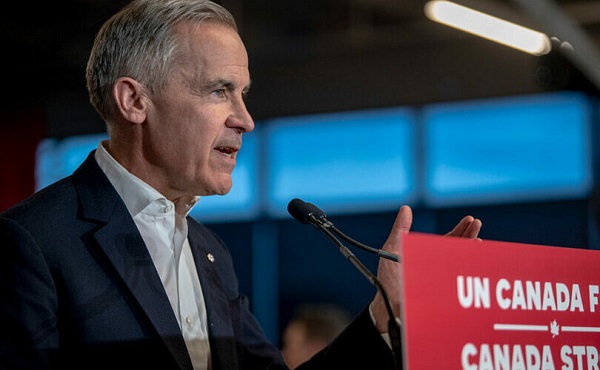Business
Strike Two for Guilbeault – Federal Court Overturns Plastics Ban

From EnergyNow.ca

In a welcome decision by the Federal Court, the plastics ban first implemented in 2022 by Environment Minister Steven Guilbeault has been struck down by the Federal Court. Catherine Swift, President of the Coalition of Concerned Manufacturers and Businesses Canada (CCMBC) stated “Every one of the three reasons this ban was opposed by the plastics industry and the governments of Alberta and Saskatchewan were supported by this court decision. It was a slam dunk against overreach by the Environment Minister and the Trudeau government.”
The court decision cited as unreasonable the inclusion of plastic material as toxic under the Environmental Protection Act, as well as deeming the Environment Minister’s refusal to have a Board of Review assess the risks of plastic materials unreasonable. In addition, as the provinces of Alberta and Saskatchewan joined in the industry’s legal action on the basis that the federal government was overstepping its jurisdiction and the law was effectively unconstitutional, the court agreed with that as well.
As an organization that represents a number of plastics manufacturers as well as oil and gas producers which provide the raw material for the plastics industry, the CCMBC views this decision as sensible and fact-based. Swift commented that “The issue with plastic has never been that it should be eliminated, but rather that it should be properly recycled. The plastics industry has for years made many solid recommendations as to how that can be achieved.” The court agreed that plastics are ubiquitous in our daily lives. Plastic products are also irreplaceable in many essential areas such as health care, food packaging and industrial products. In many cases, plastics also are positive for the environment, such as when they replace heavier materials in the auto sector, enhancing the fuel efficiency of automobiles.
This is the second time in the past month that Guilbeault has been rebuked by Canadian courts. In mid-October, the Supreme Court of Canada ruled that the federal Impact Assessment Act (also known as the “no more pipelines” bill) was unconstitutional. These decisions could also be precedent-setting for future legal actions against federal legislation, such as the Clean Electricity
Regulations that are now under consideration and are widely considered to be unconstitutional as they impinge on provincial jurisdiction over the electricity system.
Swift concluded “This federal government has made a habit of intruding on provincial jurisdiction. Now that two court decisions have ruled against them on important issues, they will hopefully take more care in future to respect the Constitution and make realistic decisions that benefit Canadians, not punish them.”
The CCMBC was formed in 2016 with a mandate to advocate for proactive and innovative policies that are conducive to manufacturing and business retention and safeguarding job growth in Canada.
Business
Musk Slashes DOGE Savings Forecast By 85%


From the Daily Caller News Foundation
By Thomas English
Elon Musk announced Thursday that the Department of Government Efficiency (DOGE) is now targeting $150 billion in federal savings for fiscal year 2026 — dramatically scaling back earlier claims of slashing as much as $2 trillion.
Musk initially projected DOGE would deliver $2 trillion in savings by targeting government waste, fraud and abuse. That figure was halved to $1 trillion earlier this year, but Musk walked it back again at Thursday’s Cabinet meeting, saying the revised $150 billion projection will “result in better services for the American people” and ensure federal spending “in a way that is sensible and fair and good.”
“I’m excited to announce we anticipate saving in FY ’26 from a reduction of waste and fraud a reduction of $150 billion dollars,” Musk said. “And some of it is just absurd, like, people getting unemployment insurance who haven’t been born yet. I mean, I think anyone can appreciate — I mean, come on, that’s just crazy.”
The announcement marks the latest in a string of revised projections from Musk, who has become the face of President Donald Trump’s aggressive federal efficiency agenda.
“Your people are fantastic,” the president responded. “In fact, hopefully they’ll stay around for the long haul. We’d like to keep as many as we can. They’re great — smart, sharp, finding things that nobody would have thought of.”
Musk originally floated the $2 trillion figure during campaign appearances last fall.
“I think we could do at least $2 trillion,” Musk said at the Madison Square Garden campaign rally in November. “At the end of the day, you’re being taxed — all government spending is taxation … Your money is being wasted, and the Department of Government Efficiency is going to fix that.”
By January, he softened expectations to a “really quite achievable” $1 trillion target before downsizing that figure again this week.
“Our goal is to reduce the deficit by a trillion dollars,” Musk told Fox News’ Bret Baier “Looked at in total federal spending, to drop the federal spending from $7 trillion to $6 trillion by eliminating waste, fraud and abuse … Which seems really quite achievable.”
DOGE’s website, which tracks cost-saving initiatives and contract cancellations, currently calculates total federal savings at $150 billion.
2025 Federal Election
Taxpayers urge federal party leaders to drop home sale reporting to CRA

Party leaders must clarify position on home equity tax
The Canadian Taxpayers Federation is calling on all party leaders to prove they’re against home equity taxes by pledging to immediately remove the Canada Revenue Agency reporting requirement on the sale of primary residences.
“Canadians rely on the sale of their homes to pay for their golden years,” said Carson Binda, CTF B.C. Director. “After the government spent hundreds of thousands of dollars flirting with home taxes, taxpayers need party leaders to prove they won’t tax our homes by removing the CRA reporting requirement.”
Right now, the profit you make from selling your home is exempt from the capital gains tax. However, in 2016, the federal government mandated that Canadians report the sale of their homes to the CRA, even though it’s tax exempt.
The Canada Mortgage and Housing Corporation also spent at least $450,000 to study and influence public opinion in favour of home equity taxes. The report recommended a home equity tax targeting the “housing wealth windfalls gained by many homeowners while they sleep and watch TV.”
“A home equity tax would hurt seniors saving for their golden years and make homes more expensive for younger generations,” Binda said. “If the federal government isn’t planning on imposing a home equity tax, then Canadians shouldn’t be forced to report the sale of their home to the CRA.”
-

 2025 Federal Election2 days ago
2025 Federal Election2 days agoResearchers Link China’s Intelligence and Elite Influence Arms to B.C. Government, Liberal Party, and Trudeau-Appointed Senator
-

 Business1 day ago
Business1 day agoCanadian Police Raid Sophisticated Vancouver Fentanyl Labs, But Insist Millions of Pills Not Destined for U.S.
-

 2025 Federal Election2 days ago
2025 Federal Election2 days agoPoilievre Announces Plan To Cut Taxes By $100,000 Per Home
-

 2025 Federal Election2 days ago
2025 Federal Election2 days agoTwo Canadian police unions endorse Pierre Poilievre for PM
-

 2025 Federal Election19 hours ago
2025 Federal Election19 hours agoTaxpayers urge federal party leaders to drop home sale reporting to CRA
-

 2025 Federal Election22 hours ago
2025 Federal Election22 hours ago‘Sadistic’ Canadian murderer claiming to be woman denied transfer to female prison
-

 2025 Federal Election2 days ago
2025 Federal Election2 days agoCarney needs to cancel gun ban and buyback
-

 2025 Federal Election2 days ago
2025 Federal Election2 days agoMark Carney vows to provide sterilizing puberty blockers to children ‘without exception’







